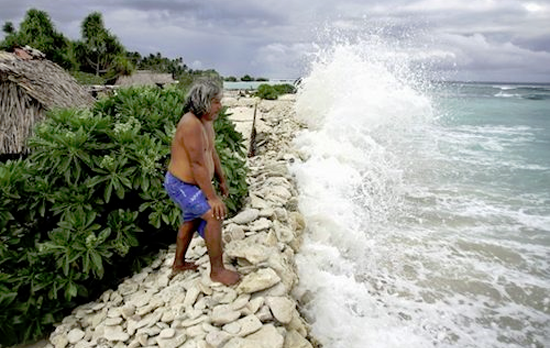
Although the Pacific nation of Kiribati has been identified as one of the most vulnerable countries to the impact of climate change, little is known about the attitudes of the local media and the public toward this issue. This is in contrast to empirical studies’ findings which have shown that the public and the media were aware of the threats posed by climate change. Aware of and concern about are very different from "we care and let’s do something because it is our country". President Anote Tong and his growing focus on this issue – centred on his close relationship with the foreign news media – have increasingly cast his I-Kiribati people as the victims and thus further marginalised their ability to learn about climate change. Further to this, there is no connection with what Tong has declared overseas with his government’s 2008-2011 Development Plan. This thesis argues that Kiribati is not united on climate change. Traditional, cultural and religious beliefs about land, environment and sea, and division among educated elites and political parties are some of the key barriers to communicating and receiving climate change stories. The government’s closed door policy, top down approach and its one-way communication have restricted the media’s access to information relating to climate change, and more importantly how 'climate funds' are distributed in the country. Despite attempts by the Secretariat of the Pacific Regional Environment Programme (SPREP) to bridge this gap with training workshops to increase media reporting, this study argues that the regional organisation has become part of the problem. Its workshops have been flawed and lack a solid theoretical basis. These complex issues shed new light on the problems facing the Kiribati media on communicating climate change to a society that is not united on this issue. Therefore, a culturally planned deliberative journalism model based on the karoronga cultural concept is proposed as a framework to engage the media in addressing these issues and encouraging participation of I-Kiribati on climate change discourse through a bottom up, vertical and horizontal communication approach. This is an emerging challenge for the Kiribati media.
Keywords: climate change, deliberative journalism, development studies, development communication, environmental journalism, journalism education, journalism training, karoronga
Korauaba, Taberannang (2012). Media and the politics of climate change: A case study on journalism in a 'disappearing nation'. Unpublished Master of Communication Studies thesis, Auckland: Auckland University of Technology. Thesis held @ Scholarly Commons AUT: http://aut.researchgateway.ac.nz/handle/10292/4503


